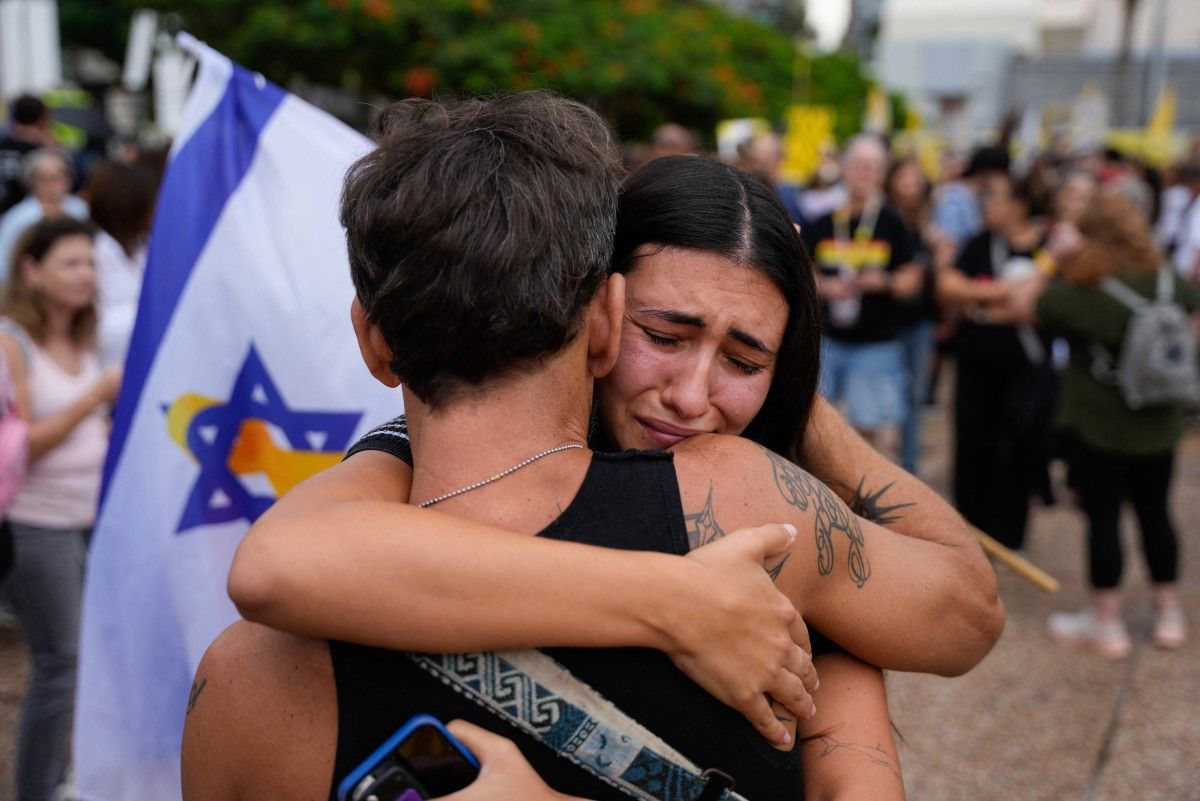- Home
- Middle East
- Israeli Cabinet to Vote Thursday on Gaza Ceasefire and Hostage Deal

People react at Hostage Square in Tel Aviv on October 9, 2025, following news of a new Gaza ceasefire deal. ©MAYA LEVIN / AFP
After nearly two years of war in Gaza, Israel and Hamas have agreed to a ceasefire and the release of hostages in what is being hailed as a historic step toward ending the conflict. The agreement, brokered through intense negotiations in Egypt with the support of the United States, Qatar, Egypt, and Turkey, represents the first phase of US President Donald Trump’s ambitious 20-point peace plan.
However, while momentum is building, full implementation still hinges on formal approval by the Israeli government. Prime Minister Benjamin Netanyahu’s office confirmed that a special cabinet meeting will take place Thursday evening at 18:00 local time (15:00 GMT) to vote on the deal.
In a statement, Netanyahu’s office emphasized: “Contrary to Arab media reports, the 72-hour countdown will begin only after the agreement is approved in the cabinet meeting.”
Upon the implementation of the agreement, Israel will reportedly allow 400 aid trucks into Gaza daily during the first five days, with numbers increasing as the plan progresses.
The initial withdrawal from Gaza will involve logistical forces from divisions that operated in Gaza City over the past month as part of the “Merkavot Gideon B” operation. The Israeli army is reducing non-combat units in the enclave, and throughout the day and weekend, combat forces will gradually exit the Strip. Additionally, thousands of reserve soldiers are expected to be released starting next week.
Starting this coming weekend, Hamas will reportedly regain control over most areas of the Gaza Strip, according to Israeli media reports. Egypt’s state-run channel Al-Kahera Al-Ikhbariya reported that the ceasefire in Gaza has already taken effect.
First Phase of Peace Plan Underway
US President Donald Trump announced on Wednesday that Israel and Hamas had agreed to the first phase of a ceasefire and peace plan aimed at ending the two-year Gaza war. The move marks the start of a twenty-point peace initiative, which Trump described as a path toward a “Strong, Durable, and Everlasting Peace” in the region.
According to Trump’s post on Truth Social, both sides have “signed off on the first phase” of the plan. This stage includes the release of all hostages held in Gaza, the withdrawal of Israeli forces to an agreed-upon line, and the entry of humanitarian aid into the territory.
“This means that ALL of the hostages will be released very soon, and Israel will withdraw their troops to an agreed upon line,” Trump wrote, calling it a “GREAT Day for the Arab and Muslim World, Israel, all surrounding Nations, and the United States of America… BLESSED ARE THE PEACEMAKERS!”
Details of the Agreement
The first phase of the agreement includes:
-
Full release of hostages held by Hamas in Gaza, including the return of bodies.
-
Exchange of Palestinian prisoners held by Israel.
-
Withdrawal of Israeli troops to a designated line.
-
Daily entry of humanitarian aid, with 400 aid trucks expected in the first five days, and more to follow.
-
Gradual de-escalation, with non-combat and later combat Israeli units pulling out of the Gaza Strip.
The Israeli military confirmed Thursday that it had begun operational preparations for troop withdrawals. “Preparations and a combat protocol are underway to transition to adjusted deployment lines soon,” the army said.
Israeli media reports suggest Hamas will regain administrative control of large parts of Gaza once the ceasefire is in place. They also report that hospitals are already preparing to receive the freed hostages.
Global Reactions: Cautious Optimism
International leaders have widely welcomed the agreement, while urging both parties to uphold their commitments.
UN Secretary-General António Guterres called it a “momentous opportunity,” adding that “the suffering must end.” He confirmed that the UN will scale up aid delivery and reconstruction efforts in Gaza.
Palestinian President Mahmoud Abbas described the deal as a possible “prelude to a permanent political solution” and renewed his call for the creation of an independent Palestinian state.
Israeli Prime Minister Netanyahu hailed the agreement as “a great day for Israel” but emphasized that full implementation is pending cabinet approval.
President Recep Tayyip Erdoğan praised Trump for showing the “necessary political will” to push Israel toward peace.
Hamas, in a statement, described the negotiations as “responsible and serious” and urged international mediators to ensure that Israel does not “disavow or delay” the agreement.
UK Prime Minister Sir Keir Starmer expressed “profound relief,” calling the deal “a crucial first step” toward ending the conflict.
Australian Prime Minister Anthony Albanese said the agreement was “a much-needed step towards peace” after years of bloodshed.
EU foreign policy chief Kaja Kallas hailed the deal as “a major diplomatic accomplishment.”
European leaders echoed optimism. Italy’s Prime Minister Giorgia Meloni called the development “extraordinary news.” France’s President Emmanuel Macron said he hoped it would pave the way for a “political solution.” Germany’s Chancellor Friedrich Merz described the developments as “encouraging,” while Spain’s Prime Minister Pedro Sánchez stressed that the suffering of civilians “must never be repeated.”
US House Majority Leader Chuck Schumer said the deal “brings a huge sigh of relief to hostage families, to all of Israel, and to Palestinians who have suffered for so long.”
Foreign Ministry spokesman Guo Jiakun reaffirmed Beijing’s support for a “permanent and comprehensive ceasefire,” adding that “Palestinians should govern Palestine.”
Next Steps and Ongoing Diplomacy
A summit of foreign ministers from Germany, Spain, Italy, the UK, Turkey, Egypt, Saudi Arabia, the UAE, Qatar, and Jordan, along with EU foreign policy chief Kaja Kallas, is set to convene in Paris on Thursday to discuss the ceasefire’s implementation and broader regional implications.
Read more



Comments